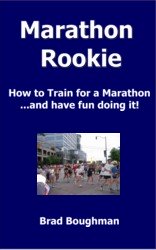
September 04, 2006
I often receive emails with questions relating to physical pain while training for a marathon. After all, pain and injury are common when training to achieve the monster goal of running a marathon or half marathon.
On the physical side, pain in the knees and shins are the most common emails I receive. So what do you do when those pains are bringing you down? Taking time off for recovery is one thing, but many aspiring marathoners say they feel they have failed and have lost a bit of their motivation or edge when hitting the trails again.
Often with an injury, we get very discouraged and disappointed because we fear our goal will not be realized or that we have simply failed. Think long and hard about why you wanted to run the marathon in the first place.
Take a step back and think about how finishing will make you feel. Picture yourself crossing the finish line and feel what you expect it to feel like. Even take a few minutes to do this each day to close your eyes and picture what you see and expect. This simple step works wonders in getting back the drive and edge. Even think about how much better it will feel to finish after overcoming the pain that snuck up on you without warning!
Following are a few emails from readers who recently raced:
"I ran a 5K on Friday evening to benefit Alzheimer's Disease. What inspired me was the runners in the 50+ categories--their times and the great shape they were in. One women who won in her age group had just come back from open heart surgery 2-3 months prior to the race! Inspiring!!! It's observations like this that keep me running!"
- Laurie in Buffalo, NY (Editor's note: Visit and www.alz.org to learn more about Alzheimer's)
I ran my first marathon on Sunday 27th August. It was one of the best things I've ever achieved in the 30 years of my life. It was mentally and physically challenging and I learned a lot from it and can't wait to do it again next year. I ran it in 4 hours and 15 minutes. I can't wait until next week when I can run again.
- Renata W. in Australia
Should I lift weights first or should I do my cardio exercise first?
The answer to that depends on a few different factors and is most influenced by what you are trying to accomplish. In general, I much prefer to lift first and then run, but that is not always practical and is not always the best option for everybody. These are the factors that play into whether you should lift first or run first:
• How many times are you working out today? If you are going to be doing two seperate workouts, one of cardiovascular exercise and one with strength training, then it is less important which you do first; the farther apart in the day that your workouts are, the less important it becomes. You should definately make a note of what you did in each workout, so that if you try comparing it to a workout from a different day you can factor in how the earlier workout affected it.
• Are you trying to lose weight? If you are trying to lose weight, then you should lift before you run. Your muscles will be able to better utilize the glycogen stored in your body, and your cardiovascular exercise will skip straight to burning fat for fuel.
• How long can your workout be? The hours your gym is open and how long you have to do your workout will make a difference in what you can do. If you are doing two seperate workouts this is especially important, because you can plan your different workouts and their duration around your work or gym schedule based on how long each will take and where you need to go.
• What is the focus of your workout? If your focus is on a hard running workout and easy weights, then you may want to run first. If you are planning on lifting to exhaustion and running easy, then you should definately lift first. If both are going to be tough workouts, you may want to consider two workouts at different parts of the day; if you are doing one workout, then you should lift first. Running will directly take the fuel you need to lift and make you tired and weaker when you are lifting. Lifting can affect a tough cardio workout, but is less likely to have detrimental (or dangerous) side effects.
In general, I recommend lifting first due mainly to fuel issues. It is easier to lift and then run. It is also safer; running first can leave you lifting more weight than you can handle if you do not take it into account, whereas if you lift first your biggest danger is if you are tired and distracted and do something stupid like run into a car. Sometimes, though, scheduling makes it difficult to do things in that order, and now and again it can be nice to change things up from how you normally do it because variety will keep your workouts from getting stale.
- Contributed article from Blaine Moore, marathon runner and owner of RunToWin.com.
Happy Running!
Brad Boughman
www.MarathonRookie.com

• New! eBooks now available in Paperback!
• Subscribe to Runner's World at Amazon.com between September 1-30, 2006 and receive a $5 Coupon!
• New personal coaching programs.